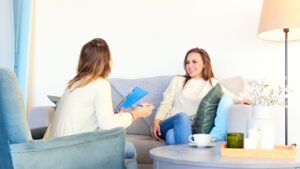In an era where stressors seem ever-present, cultivating resilience has become an essential skill for maintaining mental well-being. In this blog post, we delve into the transformative power of therapy as a tool for fortifying resilience and enhancing mental health. Therapy offers a safe space to explore emotions, confront challenges, and develop coping mechanisms in the face of adversity. Through evidence-based techniques and personalized guidance, therapy equips individuals with the skills to navigate life’s ups and downs with greater ease and confidence. Whether it’s managing work-related stress, coping with relationship difficulties, or overcoming past traumas, therapy provides invaluable support tailored to individual needs. Join us as we explore the profound impact of therapy on resilience-building, uncovering the ways in which it empowers individuals to not only endure life’s challenges but thrive in the face of adversity. Discover how investing in therapy can be a transformative journey towards strengthening mental health and embracing a more resilient way of life.
The Power of Therapy in Strengthening Mental Health

Resilience, the ability to bounce back from adversity, is a quality that many aspire to possess. It’s the capacity to endure life’s challenges, adapt to change, and emerge stronger. While some individuals seem naturally resilient, for many, it’s a skill that can be cultivated and strengthened over time. Therapy plays a crucial role in this process, providing tools, support, and guidance to navigate difficult circumstances and foster mental well-being.
- Defining Resilience: Resilience isn’t about avoiding stress or hardship; it’s about how we respond to it. In therapy, individuals learn to reframe their experiences, viewing setbacks as opportunities for growth rather than insurmountable obstacles. By understanding resilience as a dynamic process rather than a fixed trait, therapy empowers individuals to build upon their strengths and develop effective coping strategies.
- Identifying Resilience Factors: Therapy helps individuals identify the internal and external factors that contribute to resilience. These may include personal attributes such as optimism, perseverance, and self-awareness, as well as external resources like social support and access to mental health services. By recognizing these factors, individuals can leverage them to enhance their resilience in the face of adversity.
- Developing Coping Skills: One of the primary objectives of therapy is to equip individuals with practical coping skills to manage stress and adversity. Through techniques such as cognitive-behavioral therapy (CBT), mindfulness, and relaxation exercises, individuals learn to regulate their emotions, challenge negative thought patterns, and maintain perspective during difficult times. These skills not only enhance resilience but also promote overall mental well-being.
- Building Social Support Networks: Strong social connections are a cornerstone of resilience. Therapy provides a safe space for individuals to explore and strengthen their relationships, whether with family, friends, or support groups. By fostering authentic connections and communication skills, therapy enhances social support networks, providing a buffer against stress and promoting resilience in times of need.
- Cultivating Self-Compassion: Central to resilience is the ability to practice self-compassion and kindness towards oneself, especially in the face of setbacks or failures. Therapy encourages individuals to challenge self-critical thoughts and develop a more nurturing inner dialogue. By fostering self-acceptance and resilience, individuals become better equipped to navigate life’s challenges with grace and resilience.
How Therapy Cultivates Resilience

Building inner strength is a journey that requires self-awareness, courage, and support. In the face of life’s challenges, resilience becomes a beacon of hope, guiding individuals through adversity towards growth and healing. Therapy serves as a transformative space where individuals can cultivate inner strength, fostering resilience that empowers them to thrive in the face of adversity.
Understanding Inner Strength
Inner strength encompasses the emotional, psychological, and spiritual resources that enable individuals to endure hardship and persevere in the face of adversity. In therapy, individuals explore the depths of their inner resources, uncovering hidden strengths and resilience that may have been dormant or overlooked. By recognizing and nurturing their inner strength, individuals develop the resilience needed to weather life’s storms with grace and courage.
Exploring Personal Narratives
Therapy provides a safe and supportive environment for individuals to explore their personal narratives and make meaning of their experiences. Through techniques such as narrative therapy and psychodynamic therapy, individuals examine the stories they tell themselves about their lives, relationships, and challenges. By reframing negative narratives and embracing a more empowering perspective, individuals cultivate resilience and agency in shaping their own destinies.
Building Self-Confidence
A key component of inner strength is self-confidence – the belief in one’s abilities and worthiness. In therapy, individuals work on building self-confidence through self-exploration, goal-setting, and skill-building exercises. By challenging self-doubt and negative self-talk, individuals learn to trust in their abilities and resilience, empowering them to navigate life’s challenges with confidence and determination.
Developing Emotional Regulation

Emotional regulation is essential for resilience, allowing individuals to navigate difficult emotions without being overwhelmed. In therapy, individuals learn techniques for managing stress, anxiety, and other challenging emotions through practices such as mindfulness, relaxation, and cognitive-behavioral therapy (CBT). By developing emotional regulation skills, individuals gain greater resilience in the face of adversity, maintaining equilibrium and clarity of mind even in turbulent times.
Cultivating Adaptability
Resilience is not about being unyielding or rigid but about being adaptable and resourceful in the face of change. In therapy, individuals learn to embrace uncertainty and navigate transitions with flexibility and grace. Through techniques such as acceptance and commitment therapy (ACT) and solution-focused therapy, individuals cultivate resilience by focusing on what is within their control and adapting to changing circumstances with resilience and creativity.
Conclusion
Meditative Minds Counseling & Wellness serves as a vital resource in Simi Valley, CA, and beyond, offering a sanctuary for individuals seeking to fortify their mental health and cultivate resilience through therapy. By providing a safe and nurturing environment, coupled with professional guidance and support, Meditative Minds equips its clients with the tools necessary to navigate life’s challenges with greater strength and resilience. In a world where mental health awareness is increasingly imperative, the services offered by Meditative Minds stand as a beacon of hope, promoting holistic well-being and empowering individuals to thrive amidst adversity. Contact them at 805-285-8466 to embark on a journey towards enhanced mental wellness.


